Project Introduction + Objectives
We are working with Vancouver Coastal Health on this project to improve upon the Vancouver Food Asset Google map, more specifically under the Kitchen Access/ community kitchen programs category. Vancouver Coastal Health runs the health care services for many areas in the Lower Mainland of BC, as well as the Sunshine Coast and the central coast. Through this project, we hope to update and improve upon the Vancouver Coastal Health excel document and asset map to increase the knowledge base of kitchen access programs within the community. Furthermore, we aim to inform the community about the asset map through in-person demonstrations and questionnaires to understand potential problems or issues that users could face when using this technology. We hope to support and help those who may be dealing with food insecurity, as we believe that having access to common things like a kitchen is something everyone should have. This asset-based community development approach allows us to focus on the strengths the community already encompasses and build upon them in hopes to also inspire positive action for change in the community along the way (Mathie & Cunningham, 2003).
Meet the group!
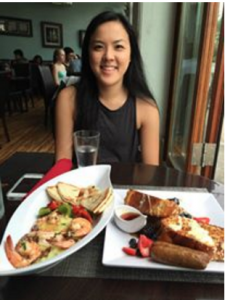 Adeline Wong, 4th Year FNH/BEd
Adeline Wong, 4th Year FNH/BEd
I love food and anything that is food-related. Food insecurity is something that I know a little about and hope to learn more of, but I’ve always thought of this issue as more related to being able to access food itself. It makes sense that having the skills and resources to cook and prepare food are also very important for people to be able to feed themselves with nutritious and safe food. I would like to learn about more resources that can help those that have not achieved food security and I look forward to learning about what past LFS350 students have discovered in terms of kitchen access and food literacy, as well as how we may make progress in this project to reach more people. I chose this project because I think the food asset map is such a genius resource that has the potential of helping so many people. I love that it gives people the independence and access to be better able to feed themselves and their families.
Jeanette Tsia, 3rd Year FNH 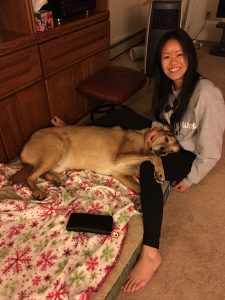
Hi! My name is Jeanette Tsia and I am a 3rd year student in Food, Nutrition and Health. Beginning from a young age I have always loved baking and cooking. Whenever I have free time I’d find myself in the kitchen testing out new recipes or making dinner for my family. Being in the kitchen allows me to experiment and be creative which is why I find cooking so therapeutic and enjoyable. Being able to create something and then enjoy it while also nourishing my body brings a sense of accomplishment and joy to me!
We often take simple things like having a kitchen for granted, and we don’t realize that many people in the community may not have such a luxury. I chose this project because I want to play a role in helping identify as many kitchens as possible around our city that will allow community members and families to learn, create, and explore the joys of cooking! I hope that by working with individuals who are also excited about this project will bring an incredible energy to our group and drive our project forward. I hope to really connect with the community and to also learn more about the Vancouver Food System.
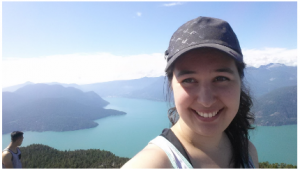 Megan Clarke, 3rd Year FNH
Megan Clarke, 3rd Year FNH
My interests include anything food and/or nutrition and anything that involves me being outdoors, including skiing, cycling, and hiking (my above photo was taken at the peak of Anvil Island in Howe Sound). I chose this project because food insecurity is an issue very close to my heart as I used to live in a very food insecure community in the interior of British Columbia. Although many programs were missing in this community, the one thing we did not have was any public kitchen access or even a place where people could go to learn about healthy eating. Therefore my goal is to learn a lot about the kitchen access programs that are available in Vancouver, and possibly look to implement them in the community I used to live in. Through this experience I also would like to learn about the asset map that is available and see how it can be used to benefit those in our communities.
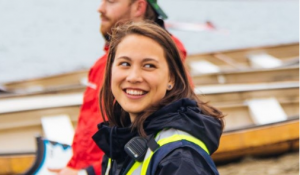 Bree Sinnott, 3rd Year Nutritional Sciences
Bree Sinnott, 3rd Year Nutritional Sciences
I have a real passion for health and nutrition which is the main reason I chose to study in the Faculty of Land and Food Systems. In my spare time, I enjoy doing things outdoors, like hiking and camping. I also volunteer with UBC Recreation as an events coordinator and love the collaboration with other volunteers and providing a UBC students with an outlet for activity. As my degree has progressed, my interest has increased with all the issues regarding food sovereignty, food systems sustainability, and food security. With this project, I hope to increase my knowledge on the subject of food security while also adding to the greater food system of Vancouver. I am excited to take on this project with my group by studying the importance of kitchen accessibility, and its link to the overall theme of food security. I am looking forward to learning more about food literacy systems, and it my goal to see how I can provide a service within my own community, and how I can add these workshops into my day to day life. With LFS 350, I am excited to expand the knowledge of the project that previous LFS students have learned, but also by gaining a better insight into our food system.
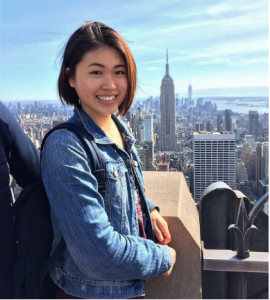 Tracy Tam, 3rd Year FNH
Tracy Tam, 3rd Year FNH
Passionate about nutrition (but also food in general), I have developed a taste for wholesome, real food from picking vegetables from my garden to creating tasty dishes. I enjoy volunteering in the community by teaching kids nutrition education, as well as staying active by paddling the waters around Vancouver.
I chose this project because I support the ability to access safe and nutritious food, and want to provide my part in helping others in the community. I am excited to be a part of this great opportunity for us to branch out from within our school boundaries to apply our knowledge but to also learn directly from the public. Nourishing ourselves begins with the essential step of food access, so I hope to see what we will find to improve food access and security with our current information or new assets we might find. I would like to gain more insight in our complex food system integrated within our very own city!
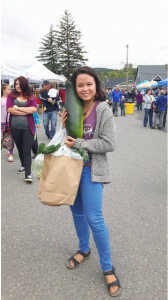 Ruby Pyke, 3rd Year Global Resources Systems
Ruby Pyke, 3rd Year Global Resources Systems
In the past few years my interest and passion in sustainable food systems has grown exponentially after working on farms around the world, being involved in education at an urban farm in Vancouver, and pursuing studies surrounding food systems. Growing up in Vancouver, I have known about poverty and food insecurity for my whole life, but have not understood the complexity and ubiquity of the problem. I am particularly interested in the intersection between sustainable development and social justice. Food insecurity is a pervasive problem in all parts of the world, but as we’ve learned and as I’ve seen working on small scale farms, it is best to first work with this problem on a local scale. On the UBC campus, I’ve dedicated a lot of time and effort into Sprouts, a student-run initiative passionate about healthy and affordable foods. This has helped me see the power in grassroots organizations.
I am excited to work on this project to acquaint myself better with the food system and food assets in my local area. I’ve been relatively oblivious my whole life to Vancouver’s food insecurity problem, but I hope to better understand the current state from this project. Similarly to how large systemic problems are best addressed on small scales, I believe that focusing on kitchen access as a means to alleviate food insecurity is a helpful way to tackle these challenging issues.
First Impressions
Going into the orientation, we were a little unsure of what to expect as we did not know many of the details of our project. However, we found the orientation held by Teya and Kathy extremely informative and interesting. We could clearly see how much this project meant to them by their level of enthusiasm and excitement while delivering their presentation. Our group was impressed by the work that has already been done on the Vancouver Food Asset Google Map as we were not aware of just how many layers of nutritional/health programs and resources there are present in Vancouver. This map is a very neat means of spreading information and we are thankful to have the chance to contribute to its implementation, through both adding additional information to the map and testing it out with members of the community. Enabling members of our community with better food access could be the beginning of allowing them to contribute to the community as well. It is important to form strong connections by listening to what the community needs (TED, 2012), and we believe our asset map is a great link for us to reach out. This is a key principle of Asset-Based Community Development, as connections within a community is essential and it is through building strong diverse relationships that we are able to effectively solve problems (Mathie & Cunningham, 2003). We feel very supported and informed by both the UBC Land and Food Systems 350 team and the Vancouver Coastal Health Dietitians about where we can ask and look for help if we were ever to run into any issues. We are excited to see where this term will take us, and we can’t wait to be working in the community.
References
Mathie, A., & Cunningham, G. (2003). From clients to citizens: Asset-based community development as a strategy for community-driven development. Development in practice, 13(5), 474-486.
TED. (2012, November 26). Ernesto Sirolli: Want to help someone? Shut up and listen!. [Video File]. Retrieved from https://www.youtube.com/watch?v=chXsLtHqfdM
One thought on “Blog #1 – Hello world!”